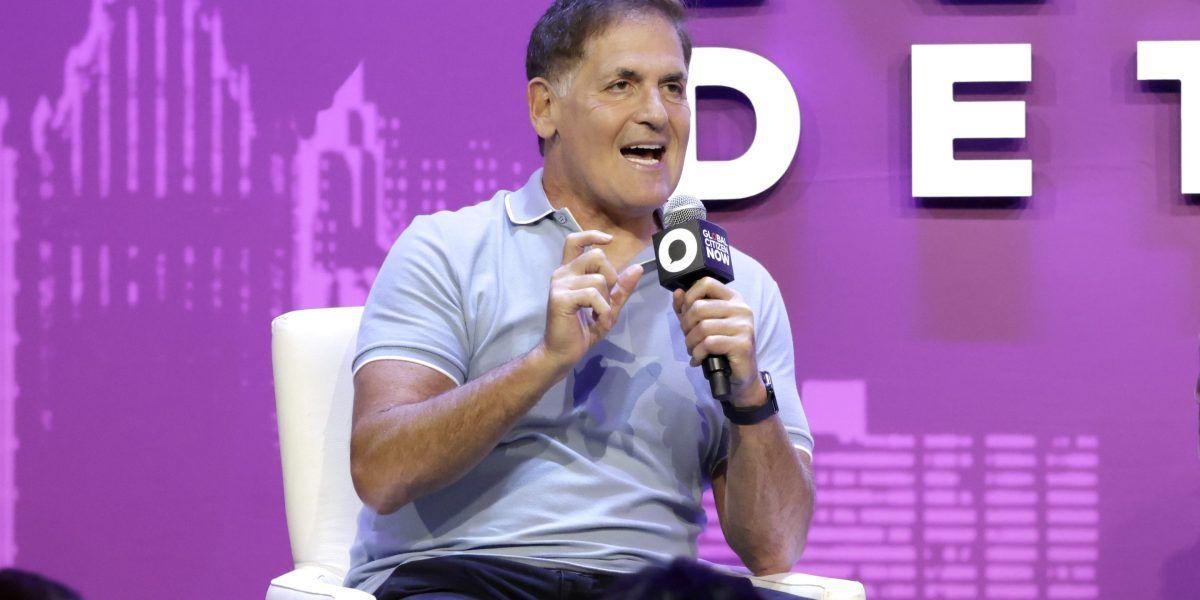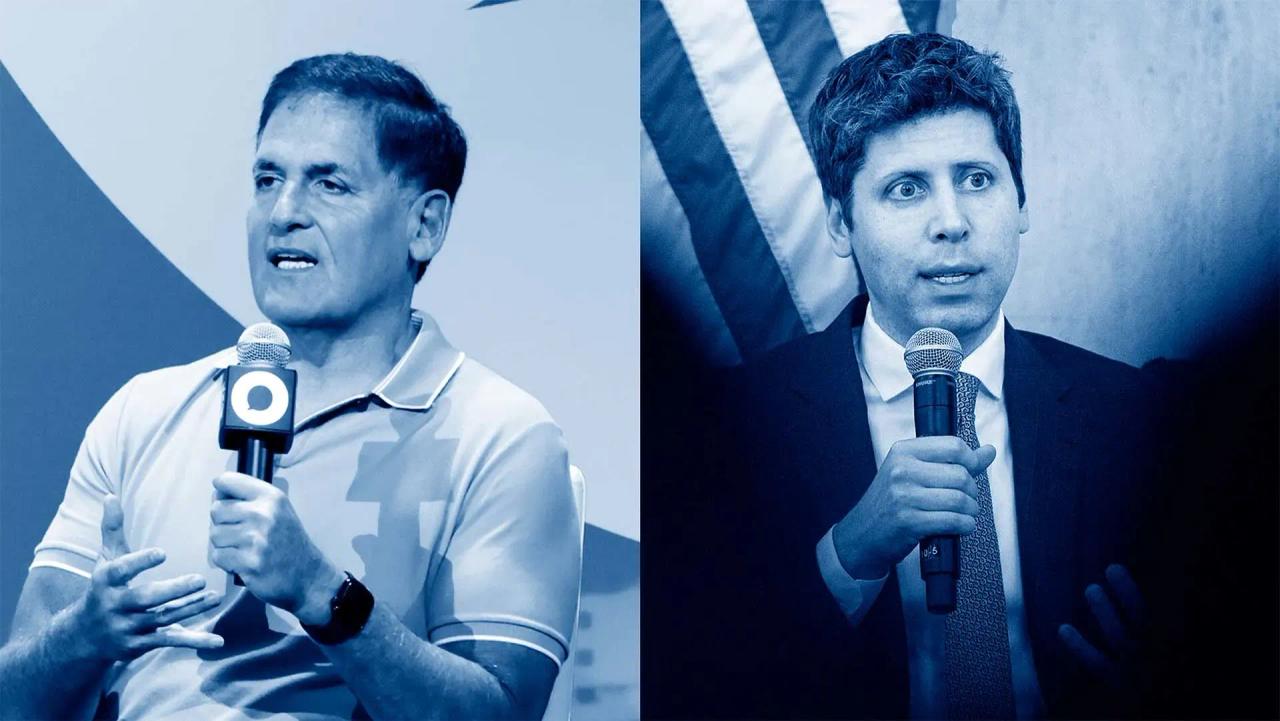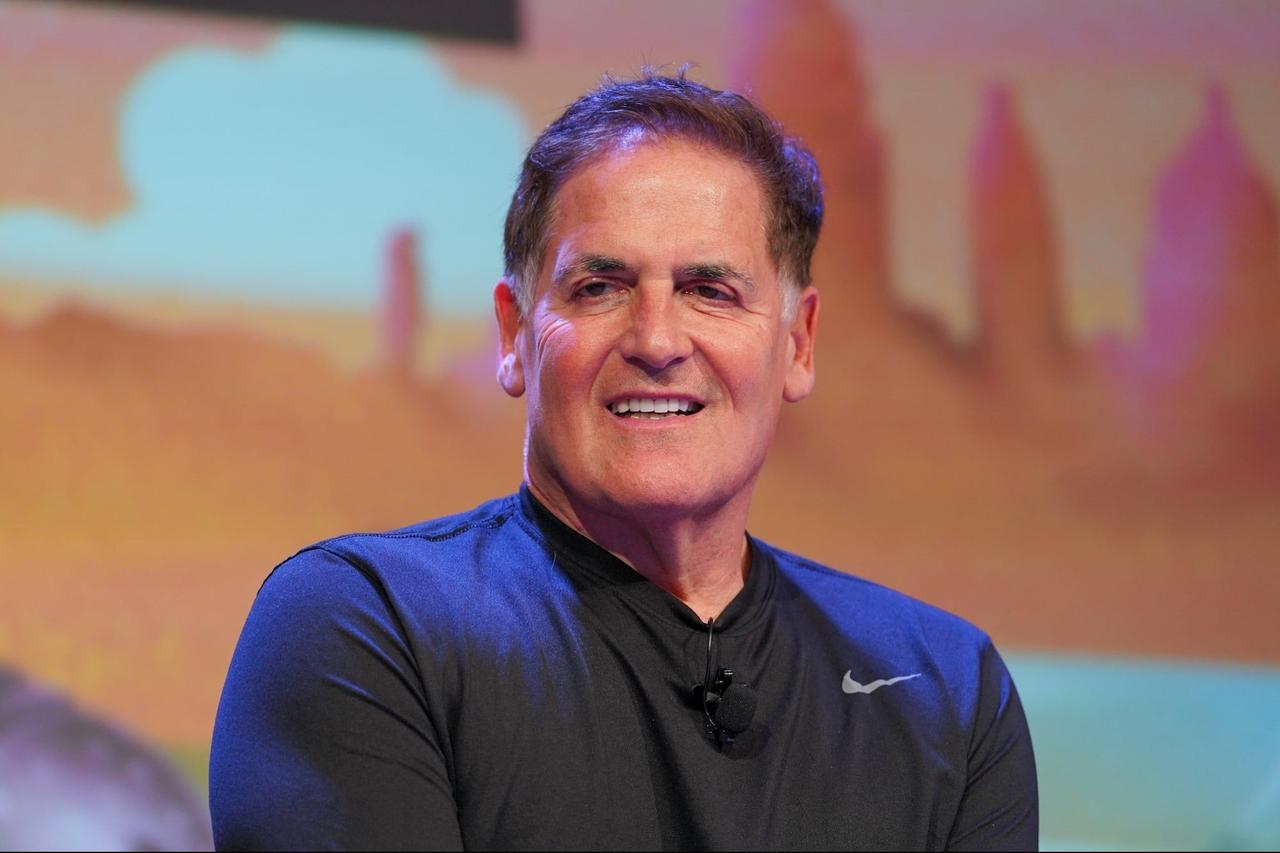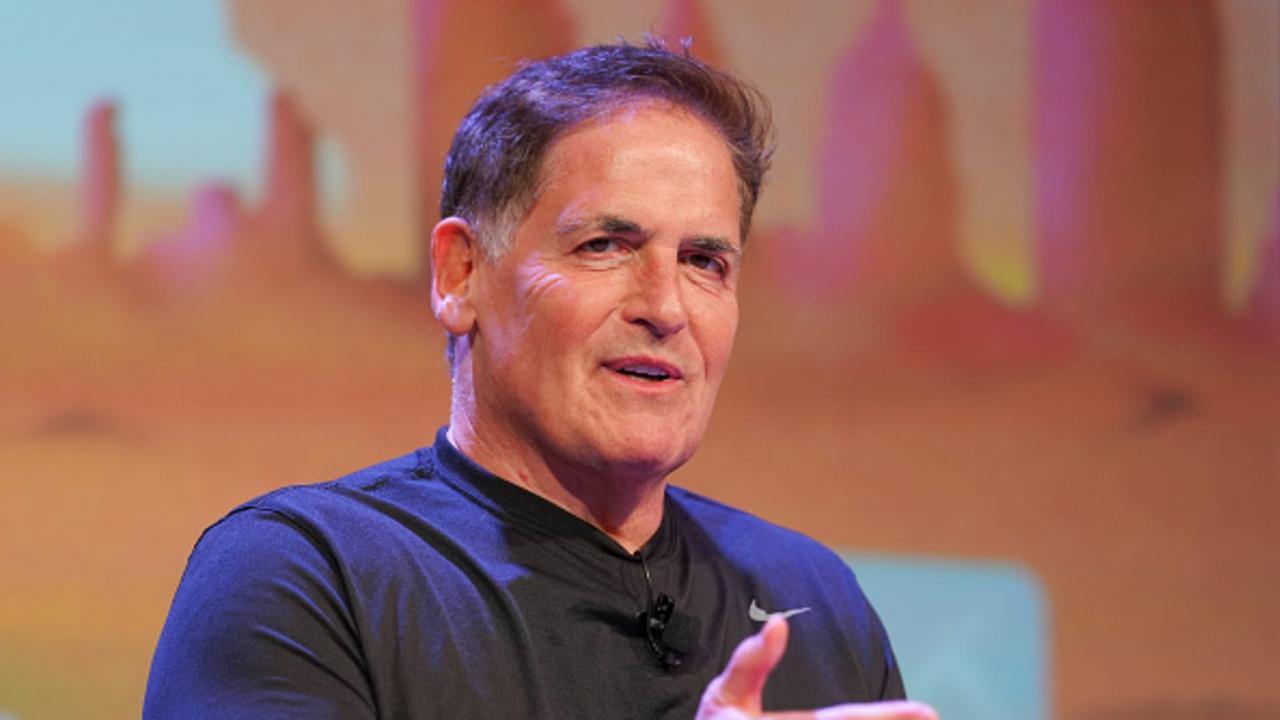Mark Cuban and Sam Altman Predict AI's Transformative Impact on Business and Employment
2 Sources
2 Sources
[1]
Exclusive: Mark Cuban says AI will be a baseline skill like email or Excel in 5 years and entrepreneurs should embrace it or get left behind
Mark Cuban is no stranger to AI advocacy -- but now the billionaire investor sees a reality where AI will be a "baseline skill like email or Excel" in five years time. Cuban believes that for business owners, being skilled in AI will be a table-stakes expectation. It's how they leverage the technology that will dictate their success in the years ahead. The billionaire told Fortune in an email Q&A that in 10 years, "we'll see more people working for themselves" with the help of AI assistants, which will turn "solo founders into full teams." "If you're not using [AI] to move faster or make smarter decisions, you're behind," he wrote. Not only does Cuban see AI as a skill necessary for anyone to learn, but also as a team member any entrepreneur can invest in to help build their future. For Cuban, the future starts now. The ex-Shark Tank star advises ZenBusiness, an AI platform that has helped over 850,000 small business owners start their own companies. Cuban sees AI assistants like the one ZenBusiness launched on Tuesday as "the ultimate equalizer." Cuban has a financial interest in the ZenBusiness platform. ZenBusiness this week announced the launch of "Velo," a new AI agent designed to automate business operations like regulatory filings, research, and website creation. The AI chatbot will take data and information provided by business owners through their ZenBusiness user portals and provide personalized advice with no additional charge, acting as a "24/7 advisor," ZenBusiness CEO and Founder Ross Buhrdorf told Fortune. Cuban said AI agents like Velo have the capacity to act as an entrepreneur's "VP of ops, your first sales rep, your data analyst, and your legal counsel rolled into one, minus the payroll." But, he warned entrepreneurs should treat AI like "your smartest intern: ask the right questions, but always double-check the answers." Buhrdorf said the chat bot comes with human technical support. In 2024, 5.12 million new applications to launch businesses were filed, a 6.9% decrease from 2023, which saw a record-breaking 5.5 million new business applications filed, according to data from the U.S. Census Bureau. While the pandemic, government stimulus and shifts to remote work drove record entrepreneurial activity, interest in starting new businesses remains strong. Cuban said the most common barriers for entrepreneurs today are "fear and funding." He believes AI agents can unlock entrepreneurs that are barred from entering an industry due to hiring costs. "[Ai isn't] just a tool, it's leverage. If you're not using AI to move quicker and make smarter decisions, you're at a disadvantage," Cuban wrote. "The most successful entrepreneur will understand how to properly use AI." Cuban believes AI won't replace entrepreneurs -- rather, it will empower the ones who know how to harness the technology. "At the end of the day, AI is a multiplier," Cuban wrote. "Use it, but don't be used by it."
[2]
Mark Cuban and Sam Altman Just Warned About Disappearing Jobs and the Need to Learn AI
OpenAI CEO Sam Altman isn't shy about discussing the future of AI. As the CEO of a market leading company, his predictions carry plenty of weight, such as his worry that AI could make things go "horribly wrong," or that AI agents will completely transform the workplace. Nor is billionaire Mark Cuban, who also sees vast changes to an AI-dominated workplace. Altman's recent remarks to finance executives at a Federal Reserve conference on large banks and capital requirements included his belief that entire job categories will be eaten up by AI. He said customer service is all but completely ready for an AI takeover right now, as reported by the Guardian newspaper. "That's a category where I just say, you know what, when you call customer support, you're on target and AI, and that's fine," he said. When a user calls a hotline now, AI answers, and it's like "a super-smart, capable person," Altman explained, adding that "there's no phone tree, there's no transfers. It can do everything that any customer support agent at that company could do. It does not make mistakes. It's very quick. You call once, the thing just happens, it's done." You may have already encountered an AI customer service system, or at the very least spoken briefly to one before being forwarded to a person with the info you're seeking. And anecdotally, if Altman's promise of no mistakes proves true, then that's a huge sell for customer service departments -- and consumer satisfaction. (We all know how frustrating it can be calling these lines.) What an AI can offer under these circumstances is also clearly defined: customers probably call with a discrete set of common issues, and the AI can be trained on what to do. But the next industry Altman said was ripe for an AI takeover is more complex, requiring deep knowledge and empathy, and there are much higher stakes at play. According to the AI CEO, AI is already better than human doctors. It can, "most of the time," surpass human physician skills, he argued, suggesting it's "a better diagnostician than most doctors in the world." But then he pointed out a very human truth: "people still go to doctors," he said, and he added that he felt the same, "maybe I'm a dinosaur here, but I really do not want to, like, entrust my medical fate to ChatGPT with no human doctor in the loop." That at least aligns with warnings from medical experts who say that while AI may be useful for medical advice under some circumstances, like helping to make medical notes, it's just too subject to misinformation errors to be trusted to give mental health advice or diagnoses, for example. In fact a group of therapists recently warned of the danger in doing so. Altman also told the bankers that he's worried near future AIs could be used by bad actors, perhaps based overseas, to attack the U.S. financial system. He cited the issue of AI voice clones as a direct risk. While he's not predicting AI will steal banking jobs here, he is essentially warning that the entire industry could be upended by AI, used the wrong way. You may think Altman is being unnecessarily doomy here. In this case, you may be more aligned with the thinking of billionaire entrepreneur Mark Cuban. He's just suggested that in his expert mind, AI will become a "baseline" workplace skill inside five years. Essentially he thinks that "like email or Excel," everyone, from fresh graduates to practiced entrepreneurs, will have to master AI to succeed at their tasks. in an interview with Fortune, Cuban predicted that thanks to the force multiplying effects AI can have, "we'll see more people working for themselves" thanks to the rise of AI assistants, possibly powered by agent AI tech, which can transform "solo founders into full teams." And worse, if you're note already using AI to "move faster or make smarter decisions, you're behind," he said. While framed more positively than Altman's statements, a closer look says Cuban is still predicting whole classes of jobs will disappear inside five years. Why would a startup CEO need a personal assistant, a coding expert or a marketing adviser if all those tasks could be done by next-gen AI? All of this, while interesting, could be dismissed as mere PR for the AI industry, but you should actually care about this expert advice. Altman's warnings could have you looking at what tasks you already feel comfortable outsourcing to an AI tool instead of a human worker. And then, taking Cuban's advice, you should consider taking time to properly educate yourself about the promises and risks of AI technology, and also plan on upskilling or reskilling your existing staff. The potential efficiencies AI promises mean they could be working more hours a week on revenue-generating tasks. The final deadline for the 2025 Inc. Power Partner Awards is this Friday, July 25, at 11:59 p.m. PT. Apply now.
Share
Share
Copy Link
Mark Cuban and Sam Altman share insights on AI's future role in business, emphasizing its potential to revolutionize entrepreneurship and reshape job markets.
AI as a Baseline Skill
Mark Cuban, the billionaire investor and entrepreneur, has made a bold prediction about the future of artificial intelligence in business. According to Cuban, AI will become a "baseline skill like email or Excel" within the next five years
1
. This assertion underscores the growing importance of AI in the business world and suggests that entrepreneurs and professionals who fail to embrace this technology may find themselves at a significant disadvantage.
Source: Fortune
Cuban emphasizes that AI proficiency will be a crucial factor in determining business success in the coming years. He states, "If you're not using [AI] to move faster or make smarter decisions, you're behind"
1
. This perspective highlights the potential of AI to enhance productivity and decision-making processes across various industries.AI's Impact on Entrepreneurship
One of the most intriguing aspects of Cuban's vision is the potential for AI to empower solo entrepreneurs. He predicts that in the next decade, "we'll see more people working for themselves" with the assistance of AI tools
1
. These AI assistants could potentially transform "solo founders into full teams," enabling individuals to manage complex business operations without the need for extensive human resources.To illustrate this point, Cuban cites the example of ZenBusiness, an AI platform that has already helped over 850,000 small business owners launch their companies
1
. The platform recently introduced "Velo," an AI agent designed to automate various business operations, including regulatory filings, research, and website creation1
.Job Market Transformation
While Cuban's outlook is largely optimistic, Sam Altman, CEO of OpenAI, offers a more cautionary perspective on AI's impact on the job market. Altman warns that entire job categories may be "eaten up" by AI in the near future
2
. He specifically points to customer service as an industry ripe for AI takeover, suggesting that AI-powered systems can already handle customer inquiries more efficiently than human agents.
Source: Inc.
Altman goes further, claiming that AI is "already better than human doctors" in many diagnostic scenarios
2
. However, he acknowledges that there is still a human preference for interacting with doctors, highlighting the complex relationship between AI capabilities and human trust.Related Stories
Challenges and Opportunities
Both Cuban and Altman stress the importance of adapting to the AI-driven future. Cuban advises entrepreneurs to treat AI like "your smartest intern: ask the right questions, but always double-check the answers"
1
. This approach emphasizes the need for human oversight and critical thinking in conjunction with AI tools.Altman, while highlighting AI's potential, also warns of possible risks. He expresses concern about bad actors using AI to attack financial systems, citing AI voice clones as a particular threat
2
. This underscores the need for robust security measures and regulations as AI becomes more prevalent in sensitive industries.Preparing for an AI-Driven Future
The insights from Cuban and Altman point to a future where AI literacy will be crucial for business success. Cuban's prediction that AI will be a baseline skill within five years suggests that professionals and entrepreneurs should start upskilling now to remain competitive
2
.For business owners, this may mean investing in AI tools and training for themselves and their employees. It also implies a need to rethink business models and processes to leverage AI's capabilities fully. As Cuban puts it, "The most successful entrepreneur will understand how to properly use AI"
1
.In conclusion, while the exact timeline and extent of AI's impact on business and employment remain uncertain, the message from these industry leaders is clear: embracing AI is no longer optional for those who wish to thrive in the future business landscape.
References
Summarized by
Navi
Related Stories
Mark Cuban Challenges AI Job Displacement Fears, Predicts New Employment Opportunities
30 May 2025•Business and Economy

Mark Cuban Predicts AI Will Create World's First Trillionaire, Urges Focus on AI Learning
04 Jul 2025•Technology

Mark Cuban Hails AI as the 'Great Democratizer' for the Next Generation
02 Oct 2025•Technology

Recent Highlights
1
OpenAI secures $110 billion funding round from Amazon, Nvidia, and SoftBank at $730B valuation
Business and Economy

2
Samsung unveils Galaxy S26 lineup with Privacy Display tech and expanded AI capabilities
Technology

3
Anthropic faces Pentagon ultimatum over AI use in mass surveillance and autonomous weapons
Policy and Regulation





